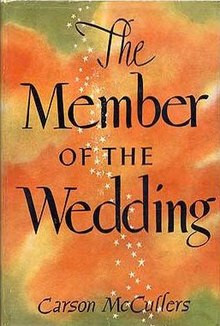The Member of the Wedding

First edition
|
|
| Author | Carson McCullers |
|---|---|
| Cover artist | Isaac Haft |
| Country | United States |
| Language | English |
| Publisher | Houghton Mifflin Company |
|
Publication date
|
1946 |
| Media type | |
| Pages | 176 pp (paperback) |
| OCLC | 57134632 |
The Member of the Wedding is a 1946 novel by Southern writer Carson McCullers. It took McCullers five years to complete, although she interrupted the work for a few months to write the short novel The Ballad of the Sad Café.
In a salacious letter to her husband Reeves McCullers, she explained that the novel was "one of those works that the least slip can ruin. It must be beautifully done. For like a poem there is not much excuse for it otherwise."
She originally planned to write a story about a girl who is in love with her piano teacher, but she had what she called "a divine spark: "Suddenly I said: Frankie is in love with her brother and the bride.... The illumination focused the whole book."
The novel takes place over a few days in late August. It tells the story of 12-year-old tomboy Frankie Addams, who feels disconnected from the world; in her words, an "unjoined person." Frankie's mother died when she was born, and her father is a distant, uncomprehending figure. Her closest companions are the family's African American maid, Berenice Sadie Brown, and her six-year-old cousin, John Henry West. She has no friends in her small Southern town and dreams of going away with her brother and his bride-to-be on their honeymoon in the Alaskan wilderness.
The novel explores the psychology of the three main characters and is more concerned with evocative settings than with incident. Frankie does, however, have a brief and troubling encounter with a soldier. Her hopes of going away are disappointed and, her fantasy destroyed, a short coda reveals how her personality has changed. It also recounts the fate of John Henry West, and Berenice Sadie Brown's future plans.
The Member of the Wedding is told from the point of view of Frankie, who is a troubled adolescent. But for some critics it is a mistake to view The Member of the Wedding as simply a coming of age novel—a "sweet momentary illumination of adolescence before the disillusion of adulthood," as it is sometimes regarded, or as Patricia Yaeger puts it, "an economical way of learning about the pangs of growing up."
For Yaeger and the Scots novelist and critic Ali Smith, this is to sentimentalize the work. They suggest that such a reading misses much of its profundity, darkness, and what Smith calls its "political heft." It should be seen, according to Smith, as a "very funny, very dark novel" and a "combination of hope, hopelessness and callousness." Its theme, says Smith, is "why people exclude others and what happens when they do."
...
Wikipedia
